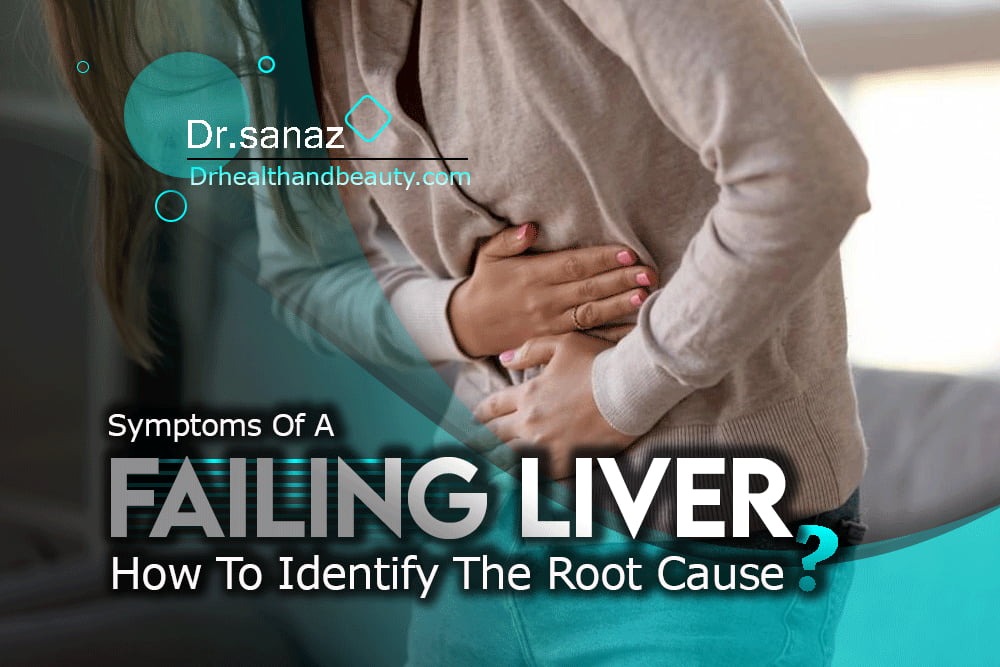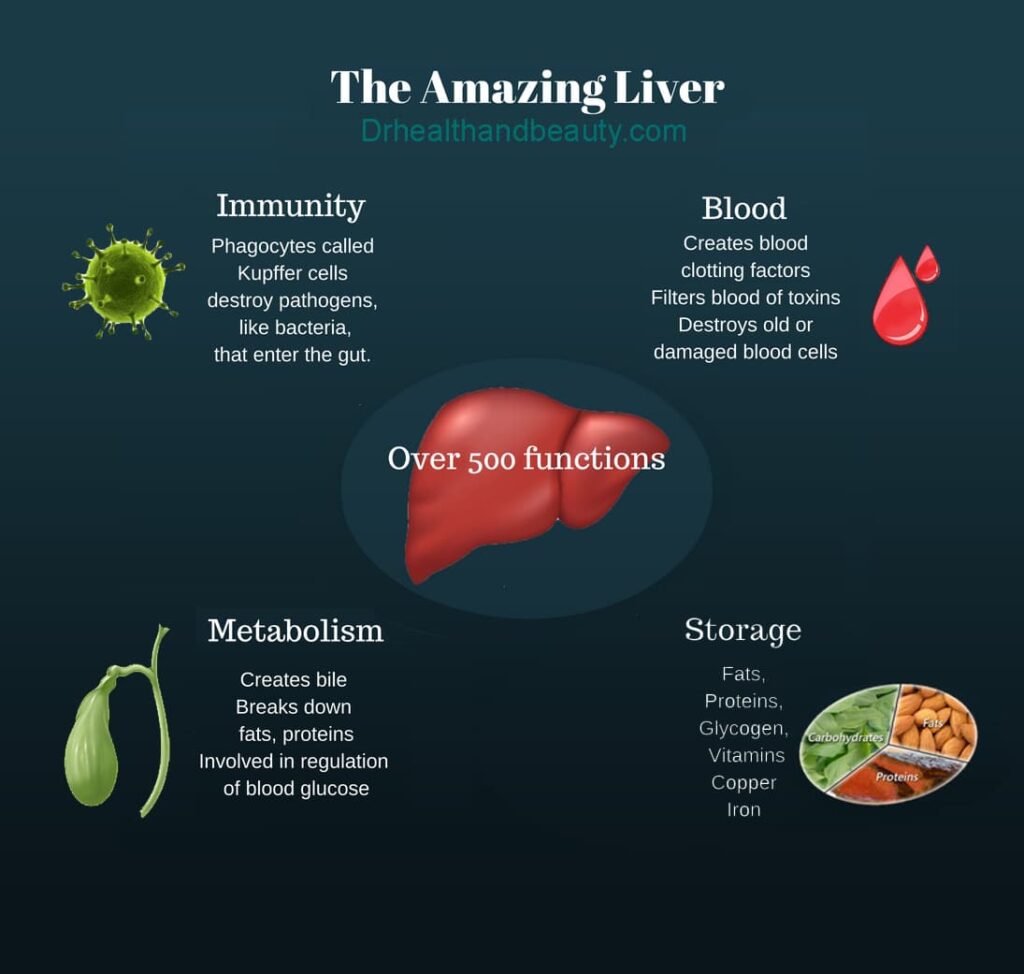

Symptoms Of A Failing Liver / How To Identify The Root Cause ?
Failing liver is a general term for any condition affecting your liver. Various reasons can cause these conditions, but all of them can damage your liver and affect its function.
Your liver is the second largest organ in your body and a vital organ that performs hundreds of tasks related to metabolism, energy storage, and detoxification. The liver helps your body digest food, turn it into energy, and store the energy until you need it. It also helps filter toxins from your bloodstream.
Table of Contents

The liver also performs hundreds of other complex functions, including:
- Fight infection and disease.
- Eliminate toxins such as alcohol from the body
- Cholesterol control
- Help blood clot
- It releases bile, a liquid that breaks down fats and aids in digestion
What are the general symptoms of a failing liver?
Symptoms of a failing liver are different depending on its primary cause. However, some common symptoms may indicate liver disease, including:
- Yellow skin and eyes are known as jaundice
- dark urine
- Pale, bloody, or black stools
- Swollen ankles, feet, or abdomen
- nausea
- Vomit
- loss of appetite
- Constant fatigue
- skin itching
- easy bruising

Types of a failing liver
- hepatitis
Hepatitis is a viral infection of your liver. This causes inflammation and damage to the liver and disrupts liver function according to its complications. Types of hepatitis are contagious, but you can reduce your risk by getting vaccinated against types A and B or taking other preventive measures, including safe sex and not sharing needles. There are five types of hepatitis:
- Hepatitis A is usually spread through contact with contaminated food or water. Symptoms may go away without treatment, but recovery may take several weeks.
- Hepatitis B can be acute (short term) or chronic (long term). It spreads through body fluids such as blood and semen. Although hepatitis B can be controlled, there is no cure. Early treatment is essential to prevent complications, so getting regular screenings is best if you are at risk.
- Hepatitis C can also be acute or chronic. The disease is often spread through contact with blood from someone with hepatitis C. While this disease does not cause symptoms in its early stages, it leads to permanent liver damage in the later stages.
- Hepatitis D is a severe type of hepatitis that only develops in people with hepatitis B. This disease does not develop spontaneously and may occur after hepatitis B. It can also be acute or chronic.
- Hepatitis E is usually caused by drinking contaminated water. This disease generally clears itself from the body within a few weeks without lasting effects.

- Fatty liver failure
Accumulation of fat in the liver can lead to fatty liver failure. There are two types of fatty liver failure:
- Alcoholic fatty failing liver, which is caused by excessive alcohol consumption.
- Non-alcoholic fatty liver failure is caused by other factors that experts are still trying to understand.
If not controlled, both types of fatty failing liver can cause liver damage and lead to cirrhosis and a failing liver. Diet and other lifestyle changes can often improve symptoms and reduce the risk of complications. The home nurse is influential in creating a healthy lifestyle and diet.
Related: “Diet And Exercise Plan For Obese Men“

- Autoimmune conditions
Autoimmune conditions include diseases in which your immune system mistakenly attacks healthy body cells. Several autoimmune diseases in which the immune system attacks your cells and damages your liver include:
- Autoimmune hepatitis: This condition causes your immune system to attack your liver, causing inflammation. If not treated, it can lead to cirrhosis and a failing liver.
Primary biliary cirrhosis (PBC): This is caused by damage to the bile ducts in your liver, causing bile to build up. PBC can lead to cirrhosis and a failing liver.
Primary sclerosing cholangitis: This inflammatory condition causes gradual damage to your bile ducts. Finally, they cause blockage and build-up of bile in your liver. It may lead to liver cancer, and you may need a liver transplant one day. Men are more likely to get it than women. This can lead to cirrhosis or a failing liver.
- Genetic conditions
Also, several genetic diseases that you inherit from one of your parents can affect your liver:
Hemochromatosis causes your body to store more iron than it needs. Excess iron is stored in your liver, heart, or other organs. This disease can lead to life-threatening conditions such as liver disease, heart disease, or diabetes. If not managed, this disease can lead to damage in the long term.
- Wilson’s disease
causes copper to build up in your liver and other organs. Its first symptoms usually appear between the ages of 6 and 35, primarily in teenagers. This disease affects your liver and can cause neurological and psychological problems.
- Antitrypsin AT (Alpha-1)
deficiency occurs when your liver cannot make enough antitrypsin alpha-1, a protein that helps prevent the enzyme from breaking down in your body. This condition can cause lung disease as well as liver disease. There is no definitive treatment, but additional treatments can help improve this failing liver.

- cancer
Liver cancers first appear in your liver. If the cancer starts elsewhere in the body but spreads to the liver, it is called secondary liver cancer. The most common type of liver cancer is hepatocarcinoma. Complications of other failing livers, especially those that are not treated, may contribute to the development of liver cancer.
- Cirrhosis of the liver
Cirrhosis refers to wounds caused by failing livers and other causes of liver damage, such as disorders caused by alcohol consumption. Cystic fibrosis and syphilis may also lead to liver damage and, eventually, cirrhosis. Your liver can regenerate and regenerate itself in response to injury.
However, this process usually leads to the formation of scar tissue. The more scar tissue that builds up, the harder it is for your liver to function correctly. The early stages of liver cirrhosis can often be treated by addressing the underlying cause. However, if left unchecked, it can lead to life-threatening complications.

failing liver
The chronic failing liver usually occurs when a significant part of your liver is damaged and unable to function correctly. In general, liver failure related to liver diseases and cirrhosis happens slowly. You may not have any symptoms at first. However, over time, you will notice more severe symptoms. Symptoms such as:
- Jaundice
- diarrhea
- confusion
- Fatigue and weakness
- nausea
This is a severe condition that requires ongoing management. On the other hand, acute liver failure occurs suddenly and is often in response to drug overdose or poisoning.
Are you at risk of suffering from failing livers?
Specific cases can expose you to some failing livers. The most famous of them are heavy alcoholic drinks. Other risk factors include:
- Shared needle
- Tattooing or body piercing with non-sterile needles
- Having a job exposed to other people’s blood and body fluids.
- Sexual intercourse without using protection against sexually transmitted infections
- Having diabetes or high cholesterol
- Family history of liver disease
- being overweight
- Exposure to toxins or pesticides
- Taking certain supplements or herbs, especially in large amounts
- Mixing certain medications with alcohol or taking more than the recommended amount of certain medications

How are failing livers diagnosed?
If you are worried that you will get liver disease, it is better to meet with your doctor to reduce the possibility of what caused liver failure in you. The examination begins with a review of your medical history and questions about your family history of liver problems. Next, they will likely ask you questions about your symptoms, including when they started and what you do to make them better or worse.
Depending on the symptoms of liver disease, you may be asked about your eating and drinking habits. Tell them about any prescription or over-the-counter medications, including vitamins and supplements.
The patient’s nurse at home can effectively help you in the timely diagnosis of symptoms, guide and refer you to a specialist doctor. After collecting all this information, the doctor may recommend the following tests:
- Liver function test
- Complete blood count test
- CT scan, MRI, or ultrasound to check for liver damage or tumors
- Liver biopsy, which involves taking a small sample of your liver to look for signs of damage or disease
How to treat failing liver
Many liver diseases are chronic, meaning they last for years and may never go away. However, even chronic liver diseases are usually treatable. For some people, lifestyle changes are necessary to improve the healing process, including:
- Limit alcohol
- Maintain a healthy weight
- Drink more water
- Adopt a liver-friendly diet high in fiber while reducing fat, sugar, and salt.
Your doctor may recommend different dietary changes depending on your specific liver condition. For example, people with Wilson’s disease should limit copper-containing foods, including shellfish, mushrooms, and nuts. Depending on the condition that affects your liver, you may also need medical treatment, such as:
- Antiviral drugs to treat hepatitis
- Steroids to reduce liver inflammation
- Blood pressure medication
- antibiotics
- Medicines to target specific symptoms, such as itchy skin
- Vitamins and supplements to promote liver health
Sometimes, you may need surgery to remove all or part of your liver. A liver transplant is generally only performed when other options have failed.

Preventing the occurrence of failing livers
There are various measures to prevent liver failure. Following a healthy lifestyle is one of the most important ways to prevent liver diseases. Here are some prevention methods:
- Avoid risky behavior. Use a condom during intercourse. If you get a tattoo or body piercing, be sensitive to cleanliness and safety when choosing your location.
- Avoid eating fatty foods. Eating fatty foods that contain much-saturated fat over time can lead to liver inflammation and liver cirrhosis.
- Get vaccinated. If you are at risk for hepatitis or have previously been infected with any hepatitis virus, talk to your doctor about getting the hepatitis A and hepatitis B vaccines.
- Use medicines wisely. Take prescription and over-the-counter medications only when needed and only in recommended doses. Do not mix drugs and alcohol. Consult your doctor before mixing herbal supplements or prescription or over-the-counter medications.
- Avoid contact with other people’s blood and body fluids. The hepatitis virus can be spread by accidental needle sticks or improper blood or body fluids cleaning.
- Keep your food safe. Wash your hands thoroughly before eating or preparing food.
- Be careful with aerosol sprays. Be sure to use these products in an air-conditioned area and wear a mask when spraying insecticides, fungicides, paint, and other toxic chemicals. Always follow the manufacturer’s instructions.
- Protect your skin. When using insecticides and other toxic chemicals, wear gloves, long sleeves, a hat, and a mask to prevent the chemicals from being absorbed into your skin.
- Maintain a healthy weight. Obesity can cause non-alcoholic fatty liver failure.

Conclusion
“failing liver” means any malfunction of the liver which causes disease. The liver is responsible for many essential functions of the body, and in case of disease or injury, the loss of functions can cause significant damage to the body.
Failing liver is a broad term; if the liver cannot perform any of its functions, then there is a problem, and this problem is a disease.
An organ as complex as the liver can experience many problems. Having a healthy liver is very important for the health of the body. However, the consequences of having a diseased or failing liver can be dangerous or even fatal.
Share in :
Explore more


Fatty Liver, Hidden Killer/ Types And Early Warning Signs- Drhealthandbeauty

